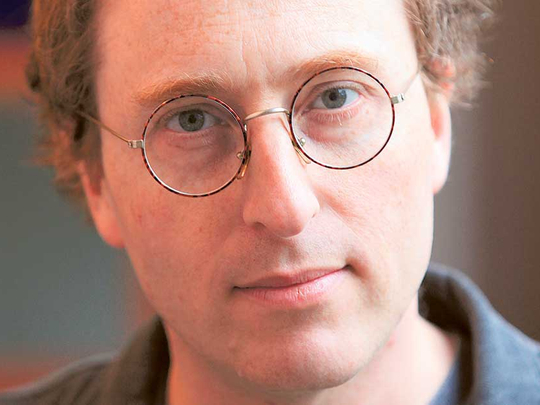
“The worst person on Twitter is President Trump,” says Jon Ronson, author of So You’ve Been Publicly Shamed — an exploration of online humiliations where trolls and self-appointed moral judges have run amok. Having written a book that’s critical of public shaming, he was quick to add: “I don’t think I should say who the worst person on Twitter is. As Monica Lewinsky once said to me, ‘Don’t shame the shamers. It doesn’t move the conversation forward’.”
Interestingly, the Welshman himself suffered a hilarious Twitter meltdown after he was overlooked for the UK’s New Year Honours last December. He sent out several tweets on December 30 to his 157,000-plus followers in a rant about not being honoured as a Member of the Order of the British Empire. The 49-year-old writer tweeted that “time is running out” for him to be honoured because he is “getting old and dying.” But that was just a one-off incident.
“Trump routinely Twitter-shames his opponents, even when they’re powerless private individuals,” says Ronson. At a political forum at the end of 2015, the writer says, a young student named Lauren Batchelder stood up and told Trump that she didn’t think he was “a friend to women”. The next morning he went for her on Twitter, calling her an “arrogant young woman”. As a result, she was bombarded with rape threats and death threats. Ironically, Ronson says,“Melania Trump told a rally in Philadelphia that as First Lady she wants to tackle social media bullying, because it has ‘gotten too mean and too rough’.”
Described by Daily Show host Jon Stewart as an “investigative satirist”, the jovial writer’s observations on the latest digital chapter of the human condition remain as sharp and as funny as ever. So You’ve Been Publicly Shamed, published in 2015, is about the cruelty of social media and the brutish power of Twitter.
“Shamed began when I moved to New York City in 2012,” Ronson says. “I felt homesick and discombobulated. And so I wanted to write about other people who were having a bad time in New York City. That somehow morphed into a story about public shaming.”
“I found myself empathising with the shamed more than the shamers,” he adds. It took over two years for Ronson to complete the compulsively readable So You’ve Been Publicly Shamed, which begins with a series of case studies. So are the casualties of the Twitter mobs and trolls getting worse by the day? “They aren’t getting better,” he says.
A previous book of Ronson’s, The Psychopath Test, is in part about the tyranny of over-labelling people; a similar subject to Shamed. “We love nothing more than to declare other people insane, especially people we don’t like, and The Psychopath Test poked fun at that,” Ronson says. “I noticed that I’d give talks about it, and everyone in the audience would agree with me, and then we’d go home and do exactly the same thing on social media. We’d diagnose someone on the scantest evidence. We’d imagine we’d know everything about a person from a single badly worded tweet.”
Ronson’s books — The Men Who Stare at Goats, The Psychopath Test, So You’ve Been Publicly Shamed — tackle difficult issues, explore mysterious events and feature extraordinary people. “I try and write funny books about unfunny things,” he says about the variety of subjects he’s covered so far. When he’s convincing himself to write a book, his biggest question is: ‘Is there a mystery to solve?’
“I only want to write about things I don’t understand,” he says. “Solving mysteries is the wind behind my sails.”
A man of many interests and talents, Ronson has produced his own television and radio documentaries on top of his print journalism, but enjoys writing screenplays the most. “Because I don’t have to go anywhere,” he says. “I can wake up, make myself a coffee and get to work. Whereas when I’m writing nonfiction stories I have to get on planes and put myself in awkward and stressful and sometimes dangerous situations.”
Ronson confesses he has social anxiety. “It doesn’t help,” he says, but he’s looking forward to his March outing in Dubai for the Emirates Airline Festival of Literature. “I really want to see the desert. Also, a lot of people I trust tell me that the festival is a very good thing.”
Of all the work he’s done so far, Ronson takes pride in his non-fiction stories, especially Them: Adventures with Extremists (2001), an entertaining evaluation of gun-toting American wackos, Islamic fundamentalists, white supremacists and conspiracy theorists. “I’m also very proud of my documentary on Stanley Kubrick’s Boxes,” he says. In this 2008 film, Ronson sheds light on the mysterious archive boxes of the reclusive American director and screenwriter who died in 1999.
Coming back again to the man of the moment — US President Donald Trump — Ronson says he had a hunch that Trump would win the election. The writer trailed Trump’s presidential campaign last year which morphed into an e-book, The Elephant in the Room.
“I remember watching a particular interview Hillary Clinton did where she sounded especially insincere, and I found it difficult to watch,” he says. “This was back in May. I thought, ‘Oh my God. Donald Trump could win’. But then I idiotically believed the pollsters and the experts.”
He wrote The Elephant in the Room because Trump is a fan of a conspiracy talk show host Alex Jones, whom Ronson has known for 20 years. “I wrote about Alex back in the 1990s, and now he has Trump’s ear. I felt I needed to rekindle my relationship with Alex to try and understand the strange world around Trump.”
Two of Ronson’s books — The Men Who Stare at Goats and Frank -- have already been adapted as films. Now The Psychopath Test, one of the most intriguing and unsettling books of 2011 with its fascinating insight into the world of CEOs and the mental health industry, is reportedly being made into a feature film. Scarlett Johansson will star in the film, to be directed by Jay Roach and written by Kristin Gore, daughter of former US vice president Al Gore.
Does Ronson write books, perhaps unknowingly, with film adaptation in mind? “No,” he says. “Writing books is hard enough without trying to make them movie-adaptable. I think when you’re writing a book, your one job is to make it as good as possible.”
Having said that, his books always contain a lot of dialogue, narrative and characterisation, making them easily suitable for an adaptation. “It’s the way I naturally write – like adventure stories. I suppose they lend themselves to movies more than some other nonfiction books do,” Ronson says.
Currently, Ronson is working on an audio series called The Butterfly Effect. “It’s about consequences,” he says. “It tells the story of what happened when a boy called Fabian had a brainwave. His brainwave was to set up a business to give the world readily available free porn. And it goes to wonderfully batty places.” Ronson has also co-written a movie called Okja with South Korean film director and screenwriter Bong Joon-Ho. It’ll be on Netflix soon, he says.
He’s cagey about his new book idea and two movies, however. “I can’t tell you about the book or the screenplays,” he says. With his famed candour and wit, there are some who may find Ronson’s restraint unsatisfying, although a little wait might do us all some good.
Suparna Dutt-D’Cunha is a writer based in Pune, India.
Jon Ronson will take part in the Emirates Airline Festival of Literature to be held at InterContinental, Dubai Festival City, from March 3-11, 2017.
QUICK-FIVE:
What would I be if I hadn’t been a writer...
I’d probably be a psychologist.
A book I wish I’d written...
Slaughterhouse Five by Kurt Vonnegut.
The first novel I read...
The Lion, The Witch, and the Wardrobe.
A recent book I will remember in 10 years’ time...
Just Kids by Patti Smith.
A book I’d take to desert Island ...
I really like an anthology of diarists called The Assassin’s Cloak.
PULL-QUOTE:
“We love nothing more than to declare other people insane, especially people we don’t like”









